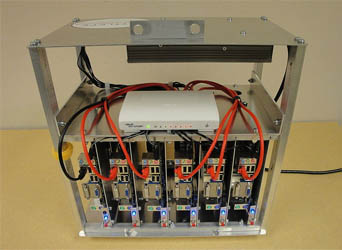Mathematics professors John Chrispell and Ed Donley are bringing classes in high-performance computing to IUP this spring that will allow students to learn how numerical simulations involving hundreds of thousands of equations are conducted.

Chrispell and Donley participated in the International Conference for High Performance Computing, Networking, Storage and Analysis in November in Salt Lake City to work more with the techniques, software, and hardware needed to do simulations on high-performance computers.
“Many of the computer simulations of interest to researchers boil down to solving large systems of equations,” Chrispell said. “These simulations are often time dependent, and the number of equations needed may be in the hundreds of thousands or even millions.”
High-performance computing is crucial to solving these equations, which would otherwise take days, weeks, or longer to solve.
As part of the conference, Chrispell and Donley received and assembled a portable mini-computing cluster, called LittleFe, which they will use to teach high-performance computing at IUP beginning in the spring 2013 semester. The professors are developing a curriculum with other educators from around the world.
“The goal in these classes will be to showcase how high-performance computing can be used to decrease the time required to complete numerical simulations,” Chrispell said.
“The LittleFe system will provide a computational tool for the classroom and a gateway for IUP students to access larger high-performance computing environments for many semesters to come.”
Despite advances in desktop computing technology, many of the larger scientific computing problems cannot be solved on even the most advanced desktop models available to the general public, he said.
Using parallel processing, or computers with multiple processors each working on different parts of a larger task, students and researchers can find solutions to complex equations faster than ever. According to Chrispell and Donley, this will allow students to stay at the forefront of mathematics and related sciences.
“Parallel and high-performance computing is a way to start examining these larger questions, keeping IUP students immersed in relevant scientific research that will have broad and lasting impacts,” Chrispell said.
Chrispell and Donley both have backgrounds in applied mathematics and numerical analysis, specifically involving solving mathematical problems using computers. Chrispell has interests that include computational modeling of fluids. Donley's interests include mechanics and digital image processing.